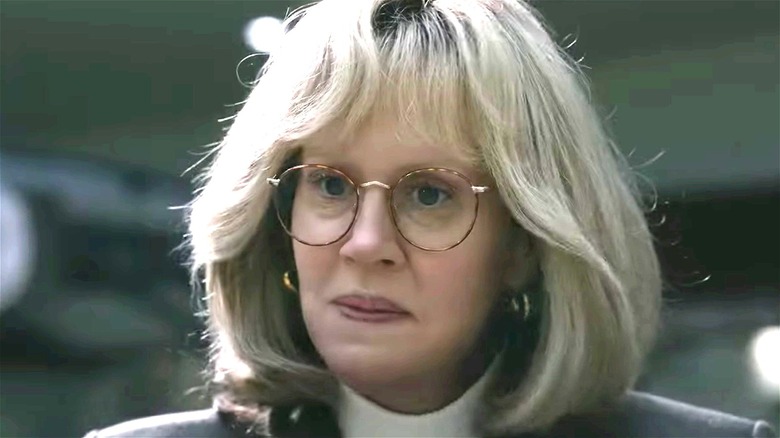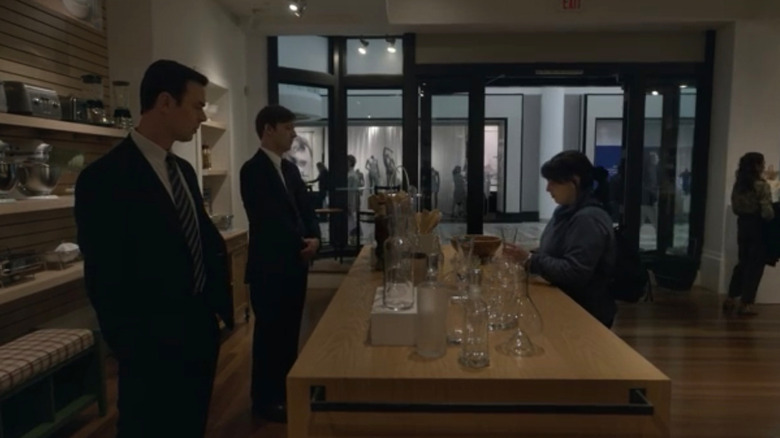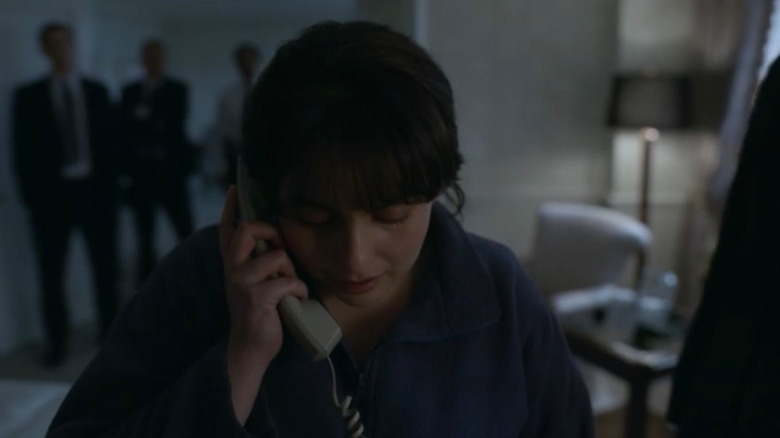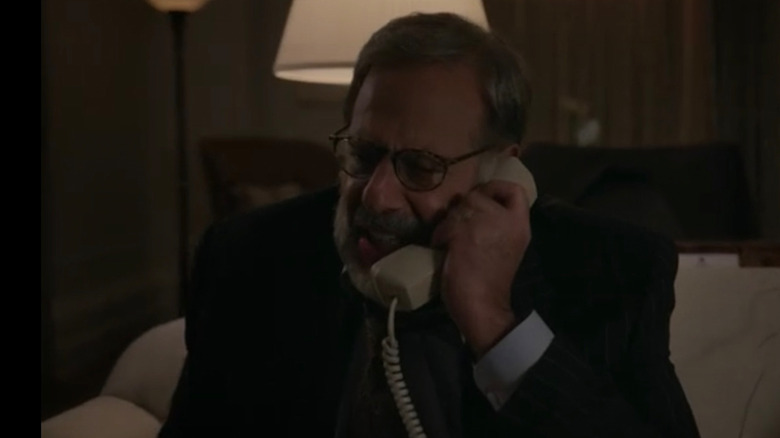How Accurate Is Impeachment: American Crime Story Episode 6?
"Impeachment" is the third season of Ryan Murphy's FX series "American Crime Story," which dramatizes the events of the biggest scandals in recent American memory. After Seasons 1 and 2 respectively focused on the trial of O.J. Simpson and the killing of Gianni Versace, Season 3 portrays the alleged sexual misconduct of President Bill Clinton (Clive Owen) and his affair with former White House intern Monica Lewinsky (Beanie Feldstein). The show is primarily told from the points of view of Lewinsky, her confidante-turned-betrayer Linda Tripp (Sarah Paulson), and Paula Jones (Annaleigh Ashford), who sued Clinton for alleged sexual harassment.
Episode 6, "Man Handled," aired on October 12, 2021. It picks up where the cold open of the season premiere left off, when Tripp and investigators from independent counsel Kenneth Starr (Dan Bakkedahl) ambushed Lewinsky at the Pentagon City Mall, then took her to the nearby Ritz-Carlton hotel for an interrogation that lasted 11 hours, as reported by The Los Angeles Times. (For further reference, you can check out this fact vs. fiction write-up of Episode 1.) The episode also briefly shows Ann Coulter (Cobie Smulders) acquiring the Linda Tripp tapes and combing through them with her fellow conservative activist lawyers, including George Conway (George Salazar).
Like any show or movie that dramatizes real-life events, some moments in "Impeachment: American Crime Story" are fictionalized by design. But "Man Handled" actually hews pretty close to what really happened that day at the mall. Here's what's fact and what's fiction in Episode 6.
The mall excursion: accurate
One of the strangest moments in this episode happens after Monica Lewinsky calls her mother Marcia Lewis (Mira Sorvino) in New York City and asks her to come to Washington, which causes a four-hour delay as Lewis takes a train to the nation's capital due to her fear of flying. During her downtime, Lewinsky convinces Starr's prosecutor Mike Emmick (Colin Hanks) to allow her to browse the mall attached to the hotel — as any self-respecting '90s gal would. Emmick and an FBI agent first accompany Lewinsky to Crate & Barrel, where she explains decanters to Emmick. Then, after getting permission to use the Macy's restroom alone, Lewinsky tries to call Clinton's secretary Betty Currie (Rae Dawn Chong) to warn her about her predicament, but gets the answering machine. Finally, Lewinsky, Emmick, and the agent wind up at a TGI Friday's-like restaurant for an awkward dinner, where Emmick outlines the potential charges Lewinsky is facing. Overall, she could see 27 years in prison.
This all pretty much happened in real life. As reported by Slate's "Slow Burn" podcast, Lewinsky told Emmick that she was feeling claustrophobic, and the prosecutor agreed to accompany her to get some fresh air. They really did visit Crate & Barrel, and Lewinsky apparently tried to lighten the mood with some jokes, like she does on the show. The attempted phone call and the dinner also occurred, although they ate at Mozzarella's American Grill (via Slate). One detail that "Impeachment" doesn't show is that Lewinsky paid for the meal so she wouldn't owe Emmick and his team anything (via Vulture).
Starr's team discouraging Lewinsky from calling her lawyer: disputed
Monica Lewinsky repeatedly asks Starr's team for permission to call her lawyer, Frank Carter (Rueben Grundy). Starr's team doesn't outright forbid her from making the call but does dissuade her in various ways familiar to anyone who's seen a few police procedurals. Prosecutor Mike Emmick repeatedly says that Lewinsky's cooperation is time-sensitive because they need her to help create a perjury trap for Bill Clinton before he's deposed in Paula Jones's lawsuit. Fellow prosecutor Jackie Bennett (Darren Goldstein) suggests that Carter wouldn't be helpful because he specializes in civil cases, not criminal. Furthermore, since Vernon Jordan (Blair Underwood) connected Lewinsky and Carter, he might be a co-conspirator in her possible trial. Bennett even threatens to withdraw the offer for immunity.
First, whether this really happened and whether Starr's team's behavior meets the legal definition of misconduct are two different questions. This episode is based on Lewinsky's recollections — she served as a producer on "Impeachment" (via The New York Times) — and Lewinsky has consistently said that she was prevented from calling her lawyer, as did Clinton's legal team and House Democrats at the time.
In 1998, the issue went before Federal Judge Norma Holloway Johnson. While the judge did show concern about Starr's team's conduct, ultimately, she ruled that they ”acted within the ethical rules in questioning Ms. Lewinsky without her attorney present," as quoted by The New York Times.
In 2000, lawyers working for Starr's successor Robert W. Ray reviewed the incident and reached a similar conclusion. In their report, unsealed in 2014, they concluded that while Emmick's behavior didn't amount to professional misconduct, he still "exercised poor judgment and made mistakes in his analysis, planning and execution of the approach" (via The Washington Post).
Bill Ginsburg shuts it all down: accurate
Monica Lewinsky's parents both play big roles in the events of that day at the Ritz-Carlton. When Marcia Lewis informs her ex-husband Bernie Lewinsky (Rob Brownstein) about their daughter's predicament, Bernie calls his friend and lawyer Bill Ginsburg (Fred Melamed). Later, near midnight, Ginsburg confronts Emmick over the phone. After an expletive-laden diatribe about Emmick's failure to connect Monica with a lawyer, Ginsburg demands that Emmick provide their offer of prosecutorial immunity in writing. When Emmick can't deliver, Ginsburg tells Monica to go home, and she does.
In reality, Monica Lewinsky did turn to Bill Ginsburg that day for legal representation. As reported by Jeffrey Toobin in The New Yorker in 1999, Ginsburg was both Bernie Lewinsky's attorney and longtime friend, and he'd known Monica since her childhood. It's unknown exactly what Ginsburg said to Emmick, but Emmick's recollection of the call matches what happened on the show. As Emmick was quoted in Ken Gormley's 2011 book "The Death of American Virtue: Clinton vs. Starr," "[Ginsburg] said a lot of rude stuff to me on the phone." Finally, Monica's decision to accept immunity in exchange for wearing a wire really did hinge on whether or not Emmick would provide the offer in writing that night.
"Impeachment" ends before Monica makes her decision, so most likely that will continue to play out in the coming episodes. But as Gormley wrote, if Monica had taken the deal then and there, it would have changed the entire trajectory of Clinton's subsequent trial.
If you or anyone you know has been a victim of sexual assault, help is available. Visit the Rape, Abuse & Incest National Network website or contact RAINN's National Helpline at 1-800-656-HOPE (4673).



